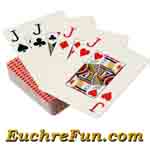
|
| « Games Index | History of Playing Cards | Early Standards | Gallery of Playing Cards | Card Backs |
All Fours
The distinguishing feature of card games in the "All Fours Family" is that even though standard trick taking rules apply, it is still legal to play a trump at any time, regardless of the lead. All Fours originated in England where it began to be played around the 17th century. It became very popular in the 19th century in America and gave rise to several other games including "Pitch", "Double Pedro" and a two player variation called "California Jack". All Fours, is played widely in Trinidad and Tobago where it is the standard card game for all occassions, and in Lancashire, England.
All Fours is played by four players in two fixed-partnerhips, but is not particularly well suited to two or three players. For a three player variation, see Seven Up.
The Cards
Standard Deck of 52 cards. Cards rank: A, K, Q, J, 10, 9, 8, 7, 6, 5, 4, 3, 2.
Objective
The object of the game is to score points by winning tricks with valuable cards in them.
For the purposes of scoring Game Point, A-10 are given the following values:
- A = 4
- K = 3
- Q = 2
- J = 1
- 10 = 10
The team who have accrued a greater total from counting up the cards they have won in tricks will score one point for "Game".
In addition, there are points for taking the Jack of trumps in a trick, and for the holders of the highest and lowest trumps dealt. A team also has an opportunity to score at the deal.
The Deal
As it is played in England, deal and play are clockwise, and the deal proceeds to the left at the end of each hand. To begin, players cut to deal, and whoever gets the highest card deals first. After that, the deal passes to the left. Each player is dealt six cards, usually in batches of 3.
When everyone has six cards, the dealer turns the next card face up, and this sets the Trump Suit. If this turned up card is an Ace, Six or Jack, the dealer's team immediately scores for it as follows:
- Ace turned up 1 point
- Six turned up 2 points
- Jack turned up 3 points
If the player on the dealer's left is happy with the Trump suit that was turned up, he says "Stand" and play begins. But if the player on the dealer's left would prefer a different trump suit, he says, "I beg". The dealer then has the option to either :
- Keep the suit that was turned up as Trumps or
- Agree to change Trumps
If the dealer decides to keep the trumps as turned up, he says, "Take one" and the opponents immediately receive one point and play begins.
If the dealer agrees to change the trump suit, he sets aside the turned up card, deals three more cards to each player, and then turns up the next card to determine the trump suit, scoring for it again if it is an Ace, Jack or Six.
- If this new turn up is of a different suit, play begins with this new suit as trumps.
- If the new turn up is the same suit as before, the dealer sets it aside and deals another three cards to each player and turns up another card, scoring again if it is an Ace, Jack or Six. This procedure is repeated until the turn produces a new trump suit.
- If the deck is exhausted before a new trump suit is found, the entire deck is reshuffled and redealt. The dealer's team keeps any points they have scored for turned up cards.
The Play
The player on the dealer's left leads first, and thereafter the winner of the trick leads to the next.
Any card can be led, but players must follow these rules.
Rules
- If a trump is led, you must follow suit, if possible. If you can't follow suit, you can play any card.
- If a card of a plain suit is led, then you can either follow suit, OR you may play a trump. But if you don't play a trump, then you still must follow suit, if possible.
There is no obligation to play a Trump. - The trick is won by the highest trump card played to it. If no trumps are played it is won by the highest card of the suit led.
As you can see in All Fours, it is always legal to play a trump. So, if spades are Trumps, and someone leads a Diamond, and you have Diamonds and Spades, you can play a Spade and try and win the Trick.
Scoring
Once everyone's cards have been played, points are scored for cards Dealt and for cards Won. The points are awarded in this strict order.
| High | 1 point | This point is won by the team of the player who had the highest trump. |
| Low | 1 point | This point is won by the team of the player who held the lowest trump that was dealt. It does not matter who wins the trick containing this trump - the point is for the original holders. |
| Jack of Trumps | 1 or 3 points |
If the Jack of Trumps is retained by the team to whom it was dealt, it's worth 1 point but if the Jack of Trumps was captured from the team to whom it was dealt, it is worth 3 points. |
| Game | 1 point | At the end of play, each team adds up the cards they have Won in tricks assigning the values to each A=4, K=3, Q=2, J=1 and 10=10. And declares their Total. The team with the highest total is awarded 1 point for Game. If both teams have the same Total no one gets Game Point. |
The first team to reach 14 wins the game. It is important to remember that the points are awarded in this order; High, Low, Jack, Game. If both teams are tied on 12, and Team A wins points ‘Game’ and ‘Jack’, but Team B wins points ‘High’ and ‘Low’, Team B will win the game because they reach 14 first.
Irregularities
Misdeal: If the dealer gives the wrong number of cards to the players, the opponents score one point for a misdeal, and the deal passes to the left.
Reneging: This occurs when the player fails to follow suit as the rules accord when he could have. There is no penalty provided the player corrects his own error before the end of the Trick. But an opposing player may call the revoke at any time up to the end of the hand. In that case, the penalties are as follows:
- If the player failed to follow a trump lead with trumps when they held one or more of the top five trumps, that player's team loses the whole of the game. A new game is started
- If the player failed to follow suit off a Trump lead when they held a small trump, the opponents are awarded 1 point and the offenders cannot win point for Game.
- If the player failed to follow suit off a Non-trump lead, the opponents are awarded 1 point, and the offenders cannot win point for game.
Calling: If a player exposes a card other than in normal play, it must be left face up on the table. The opponents can then "call" for this card to be played on any subsequent trick, provided it is played in accordance with the rules.
Variations
Being a game popular in the United States by the 19th Century, a number of variations to the basic All Fours family, have been designed, including a number of variations for three and two players:
- Double Pedro: Four Players in two fixed-partnerships.
- Seven Up: Variation for three players
- California Jack: Variation for two players.
L I N K S
How to play All Fours - Cats at Cards
Rules for All Fours - Card Games Website
History and Rules of All Fours - WikiPedia
All Fours (Seven Up) - Colonial Games
| Complete Index of Card Games » |
||||||||
| ||||||||
|
||||||||
|
||||||||
| ||||||||
| ||||||||
|
||||||||
|
||||||||
| ||||||||
|
||||||||
| Complete Index of Card Games » |



| « Games Index | History of Playing Cards | Early Standards | Gallery of Playing Cards | Card Backs |